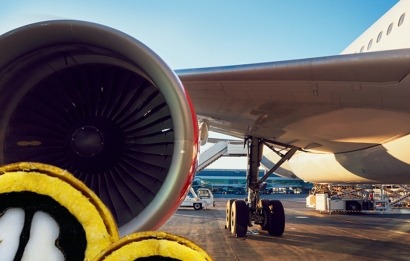
Honeywell’s Ecofining process, which was developed in collaboration with Eni SpA, offers a capital- and cost-effective solution for processing waste fats, oils and greases into renewable diesel and SAF. Blended with conventional jet fuel, the use of SAF can reduce greenhouse gas emissions by up to 80% compared to conventional fossil fuels. Ecofining has been in use since 2013 for renewable diesel and 2016 for SAF production, making it a proven tool for helping to reduce carbon dioxide emissions, particularly in air travel.
Over the past two years, Honeywell has seen rapidly increasing demand for renewable fuels technologies, including Ecofining. This growth tracks with international decarbonization efforts—especially in air travel. Initiatives like the SAF Grand Challenge and SAF tax credit in the U.S. Inflation Reduction Act as well as the European Council's 'Fit for 55' package have set in motion key drivers to expand SAF production, accelerating the energy transition and aviation's journey to net-zero emissions.
"The dramatic growth in demand for renewable fuels technology illustrates that fuel producers are accelerating adoption of solutions to help meet ambitious decarbonization goals," said Ken West, president and CEO of Honeywell Energy and Sustainability Solutions. "Our 50th license is testament to Honeywell's leadership in renewable fuels. The milestone follows back-to-back years of solution launches that harness ethanol and e-methanol—to round out one of the largest ranges of feedstock processing technologies on the market."
Acelen Renewables joins a roster of companies around the world currently licensing Honeywell’s renewable fuels technology, including BP, CVR Energy, Diamond Green Diesel, Eni, Repsol, Total, and World Energy. Of the 50 licenses, eight facilities are already in operation and more than 40 licensed plants are slated to be operational by 2030. The combined renewable fuels capacity of these plants when functioning to peak efficiency will exceed 500,000 barrels per day.
“The addition of Honeywell’s Ecofining process is essential for us to meet our goal of producing one billion liters of Renewable Diesel and Sustainable Aviation Kerosene (SAF) per year from 2026 onwards, which will make our company one of the largest biofuel producers in the world. Through our “fully sustainable” project: economically, socially and environmentally responsible, we will show the world Brazil’s full capacity to produce the fuel of the future,” said Marcelo Cordaro, COO of Acelen Renewables.

